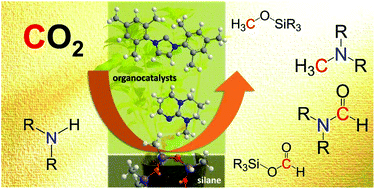Transformative reduction of carbon dioxide through organocatalysis with silanes
Abstract
Carbon dioxide (CO2) is a promising feedstock for the synthesis of complex organic chemicals due to its abundancy, non-toxic nature, and favourable physical properties. However, CO2 is considered to be a chemically unattractive reagent due to its stability and high oxidation state. Thus, to increase the energy content of CO2 and improve its versatility as a reaction substrate, various organocatalysts have been developed based on the use of silane reducing agents. We herein present an overview of the development of organocatalysts for the reductive transformation of CO2 while emphasising the factors affecting the reactions, and summarising current insights into the mechanisms governing these reactions.



 Please wait while we load your content...
Please wait while we load your content...